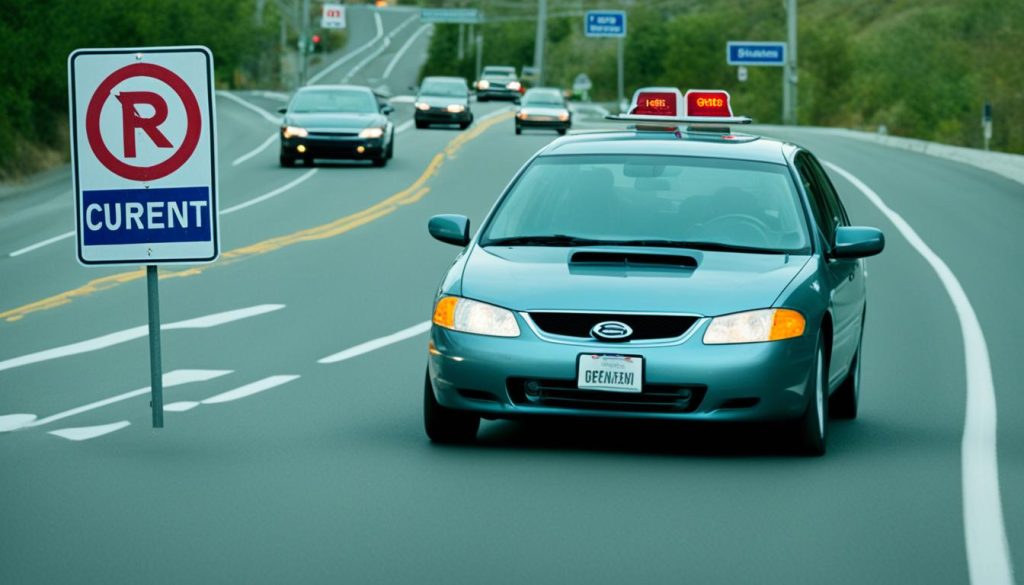Changing car insurance companies can be a daunting task, but it’s worth considering if you want to save money. Many Americans stick with their current auto insurance without realizing they could be getting a better deal elsewhere. Fortunately, transitioning your car insurance in Massachusetts doesn’t have to be complicated. By following a few strategies, you can navigate the process with ease and find the right policy for your needs.
Key Takeaways:
- Changing car insurance companies can save you money.
- Research and compare insurance companies to find the best rates and coverage.
- Contact your current auto insurer to inform them of your decision.
- Avoid a coverage gap by ensuring your new policy is active before canceling the old one.
- Notify your leasing company or lender about the insurance change.
How to Switch Car Insurance Companies
When it comes to switching car insurance companies, it’s important to follow a few simple steps to ensure a smooth transition. By taking the time to compare auto insurers, research the company, and communicate with your current auto insurer, you can avoid any potential coverage gaps and make the switch hassle-free.
1. Compare Auto Insurers
Start by doing some research to find a new auto insurance company that meets your needs. Compare quotes from multiple insurers to get an idea of the coverage options and prices they offer. Look for a company with a good reputation for customer service and claims handling.
2. Research the Company
Once you have narrowed down your options, take the time to research each company further. Look for customer reviews and ratings to get an idea of their reputation. Verify that the company is licensed and has a good financial standing. Researching the company will help you make an informed decision and ensure that you are switching to a reliable insurer.
3. Contact Your Current Auto Insurer
Before making the switch, get in touch with your current auto insurer to notify them of your decision. They can provide guidance on the cancellation process and any potential fees or penalties. It’s important to set a cancellation date that aligns with your new policy’s start date to avoid a coverage gap.
4. Avoid a Coverage Gap
To avoid a coverage gap, make sure to coordinate the start date of your new policy with the cancellation of your old one. This ensures that you maintain continuous coverage throughout the switch. You don’t want to be caught without insurance in case of an accident or unforeseen event.
5. Change Your ID Cards
Once you have secured a new auto insurance policy, be sure to change your ID cards. Contact your new insurer to obtain updated insurance cards with the correct policy information. Update your wallet, glove compartment, and any other places where you keep your insurance cards.
6. Notify Your Leasing Company or Lender
If you have a leased vehicle or are financing it through a lender, notify them of the insurance switch. They may have specific requirements for insurance coverage or additional parties to be listed on the policy. Failure to inform your leasing company or lender could result in a breach of your contract.
By following these steps, you can confidently switch car insurance companies without any hassle or coverage gaps. Remember to compare auto insurers, research the company, and communicate with your current auto insurer to make the transition seamless.
When to Switch Car Insurance Companies
Switching car insurance companies is a decision that can be made at any time. However, there are certain situations when it may be beneficial to consider a switch. Here are some common scenarios:
- Comparing Car Insurance Rates: If you’re looking to save money on your car insurance, it’s a good idea to periodically compare rates from different insurance companies. By shopping around, you can ensure that you’re getting the best possible coverage at the most competitive price.
- Experiencing Poor Customer Service: If you’re unhappy with the level of customer service provided by your current car insurance company, it may be time to explore other options. Good customer service is crucial when it comes to resolving claims and addressing any concerns or issues you may have.
- Planning to Move: If you’re planning to move to a new state or even just to a new zip code within Massachusetts, it’s important to review your car insurance policy. Different locations can have varying insurance requirements, and switching companies may help you find coverage that aligns better with your new address.
- Adding a New Driver: If you’re adding a new driver to your policy, such as a teen driver or a spouse, it’s worth comparing car insurance options. Adding a new driver can impact your premium, and different companies may offer better rates or discounts for certain demographics.
- Buying a New Car: When you buy a new car, it’s an excellent opportunity to reevaluate your car insurance coverage. Different vehicles may require different levels of coverage, and some insurance companies may offer specialized policies or discounts for specific types of cars.
- Credit Score Changes: If your credit score has recently improved, it may be worth exploring your car insurance options. Some insurance companies take credit scores into account when determining premiums, and a higher credit score could lead to lower rates.
- Increasing or Reducing Coverage: If your financial situation has changed, you may need to adjust your car insurance coverage accordingly. Whether you’re looking to increase your coverage for added peace of mind or reduce coverage to save money, switching car insurance companies can help you find a policy that aligns with your needs.

In conclusion, there are various situations when switching car insurance companies in Massachusetts can be advantageous. By comparing car insurance rates, addressing issues with customer service, considering life changes, and reviewing coverage needs, you can make an informed decision about when to switch. Remember to research different companies, gather quotes, and evaluate policy details to ensure a smooth transition.
Frequently Asked Questions About Switching Car Insurance
As you consider switching your car insurance, you may have some important questions in mind. Here are some frequently asked questions about switching car insurance:
- Can you switch car insurance at any time?
Yes, most companies allow you to cancel your policy for free at any time and start a new one immediately. So, you have the flexibility to switch car insurance any time it suits your needs.
- Can you change car insurance companies too often?
No, you won’t be penalized for switching companies frequently. However, keep in mind that some insurers may charge a cancellation fee, so it’s a good idea to weigh the potential costs and benefits before changing car insurance companies too often.
- Do you need to cancel car insurance when switching?
Yes, it’s your responsibility to inform your current insurer and set a cancellation date to avoid a coverage gap. Canceling your car insurance when switching ensures a smooth transition and helps you avoid any potential issues.
Remember, switching car insurance is a decision that should be made based on your specific circumstances and needs. If you have any further questions, don’t hesitate to reach out to your insurance provider or do your own research to make the best choice for you.

Conclusion
Switching car insurance in Massachusetts doesn’t have to be daunting. By following these strategies and considering the right timing, you can smoothly transition to a new insurance provider. Remember to compare quotes, research the company, and inform your current insurer and lender about the switch. With these steps, you can navigate the process with confidence.



No comments! Be the first commenter?